First Steps in Contracting: Essential Agreements to Launch Your New Business Successfully
Every new business needs clear contracts to protect its interests and outline important relationships.
Having the right agreements in place from the start can help prevent misunderstandings and reduce legal risks.
These contracts also make business operations smoother and more predictable.
Common essential agreements include founder or partnership agreements, customer contracts, non-disclosure agreements, independent contractor agreements, and employment offer letters.
For example, a founder’s agreement sets the ground rules among co-owners, while non-disclosure agreements safeguard confidential information.
Understanding which contracts your business needs can save you time and money in the long run.
Key Takeaways
- First contracts define how you work, protect what you own, and ensure your payments are secure.
- Templates don’t consider Texas law or business realities, custom contracts do.
- Surge Business Law makes it affordable to launch right with flat-fee agreements and membership-based legal help.
What Makes A Contract “Essential” For Startups And Small Businesses?

An essential contract provides a new business with legal protection, establishes payment terms, and outlines each party’s responsibilities.
The right agreement also supports enforceability and avoids problems that are common with generic contract templates.
Legal Protection, Payment Security, And Relationship Clarity
A startup contract should clearly outline what each party promises to do.
This includes simple but specific terms about the scope of work, payment schedules, deadlines, and deliverables.
With these details in writing, there is less room for confusion or disagreement later.
Legal protection is a primary reason why written contracts are important.
Written business contracts help prevent misunderstandings and provide evidence in the event of a dispute.
Strong contracts outline what happens if things go wrong, including penalties or subsequent steps.
Payment security is also critical for growing businesses.
Payment terms in a contract outline the amount owed, the payment schedule, and the consequences of late payments, including any applicable late fees.
This helps both sides manage cash flow and expectations.
Key agreements, such as service contracts and non-disclosure agreements, are especially important for small business growth and risk management.
Enforceability In Texas And Why Templates Often Fail
For a contract to be enforceable in Texas, certain elements must be present.
Contracts must clearly state an offer, acceptance, consideration (the exchange of something of value), and provide details about each party.
Texas business agreement law also requires contracts to be in writing for certain types of transactions, such as property leases or sales exceeding a specified amount.
Templates often fail because they tend to be generic and may not align with Texas law or a startup’s specific needs.
Using a one-size-fits-all contract can lead to disagreements or unenforceable terms.
It is safer for Texas startups to use agreements reviewed by a qualified attorney, who can adjust the language to comply with Texas business contract rules and protect the company’s interests.
Customized documentation is crucial for having a reliable and legally valid agreement.
Surge Business Law helps startups launch with confidence. Get your first client or contractor agreement drafted for a flat fee. Contact us to schedule.
6 Essential Contracts Every New Business Should Have

Every new business faces legal risks and challenges that can be managed with the right contracts.
Using clear, specific agreements helps protect owners, set expectations, and build strong professional relationships.
1. Service Agreement Or Master Services Agreement (MSA)
A Service Agreement or Master Services Agreement (MSA) spells out the terms of work between businesses and their clients or partners.
These contracts are key for service-based startups, freelancers, and consulting companies.
An MSA establishes clear rules regarding the scope of work, payment terms, deadlines, and the handling of changes.
It can also outline who will own any work created, specify liability limits, and establish rules for terminating the contract early.
Businesses benefit from a startup service agreement template that fits their needs.
Common terms in an MSA include:
- Deliverables and responsibilities
- Payment schedule
- Confidentiality obligations
- Dispute resolution process
Having a good MSA avoids confusion and helps both parties know what to expect.
2. Independent Contractor Agreement
An Independent Contractor Agreement covers the relationship between a business and people who are not employees, such as freelancers or consultants.
This is particularly important for startups, especially in states like Texas, where the rules governing contractors differ from those governing employees.
The agreement defines the exact services the contractor will provide, how and when they will be paid, and that the person is not an employee.
It often includes terms regarding project ownership, deadlines, tools to be used, and the handling of disputes.
For businesses in Texas, using a Texas independent contractor agreement template can ensure the contract complies with local regulations.
Protecting intellectual property (IP) and establishing clear boundaries regarding ownership of finished work or data is also essential.
3. Operating Agreement (LLC) Or Bylaws (Corporation)
An Operating Agreement is for LLCs, while Bylaws are for corporations.
These contract types establish clear guidelines for how the business operates and how decisions are made.
For LLC owners, an Operating Agreement for Texas LLCs helps clarify members’ roles and rights, how profits are distributed, and what happens if someone leaves or sells their share.
For corporations, bylaws establish board meetings, officer roles, voting rules, and procedures for handling disputes.
Key details covered:
- Owner or shareholder voting
- How profits and losses are divided
- Steps if an owner exits
- What happens if the company wants to dissolve
Having these legal documents in place for a new business helps avoid future disputes and keeps operations running smoothly.
4. Nondisclosure Agreement (NDA)
A Nondisclosure Agreement (NDA) is used to protect and maintain the confidentiality of sensitive information.
These are vital for startups sharing ideas, code, or business plans with employees, partners, or potential investors.
An NDA for startup founders protects trade secrets, software, customer lists, or any other information that gives a company a competitive edge.
The NDA will define what is confidential, who must keep it secret, and how long the restriction lasts.
A good NDA lists:
- What information is protected
- Who must follow the NDA
- How long does confidentiality last
- Exceptions (like info already public)
It helps reduce the chance of secrets being revealed or stolen.
5. Client Or Customer Agreement
A Client or Customer Agreement is necessary for businesses that sell products or services directly to the public or to other companies.
This contract can also be referred to as a sales agreement or terms of service.
The agreement outlines pricing, payment terms, what is included and excluded, and any applicable warranties or guarantees.
It protects both the business and the customer by clearly defining each side’s responsibilities.
Typical points in these agreements:
- Product or service description
- Payment terms and late fees
- Return, refund, and cancellation policies
- Steps for complaints or disagreements
Having a client agreement is one of the most essential business contracts for startups because it sets the standard for all customer relationships.
6. Intellectual Property Assignment Or Licensing Agreement
An Intellectual Property Assignment or Licensing Agreement covers who owns an idea, invention, logo, or content after it is created.
For new businesses, it is crucial to ensure the company owns key intellectual property (IP) and is not at risk of losing it.
An IP assignment contract moves ownership to the company.
A licensing agreement allows others to use the IP with certain limitations while maintaining control for the owner.
The contract should clearly describe what is being assigned or licensed, as well as the duration of the assignment or license.
Important sections include:
- Definition of intellectual property
- Payment or royalties (if any)
- Limits on how the IP can be used
- Rights to change, sell, or end the agreement
These agreements safeguard the company’s brand, inventions, and creative work as it expands.
Common Mistakes In Early Contracting—And How To Avoid Them

Many new business owners encounter issues due to using unclear language, failing to establish written contracts, or neglecting to keep pace with changes as their company grows.
Focusing on clear terms and regular review can save time, money, and trouble.
Vague Language And Missing Clauses
Contracts should use clear, specific language. If terms are too vague, both parties might misunderstand what’s expected.
This can lead to confusion about delivery times, payment dates, or responsibilities.
Missing important clauses—like payment schedules, renewal options, or dispute resolution—also creates risk.
For example, Texas businesses often rely on detailed client contract templates to ensure the main terms aren’t left out.
Ambiguous or missing sections can make deals unenforceable.
Using a complete contract template as a base helps new businesses avoid oversights.
List duties, deadlines, and payment terms in clear detail.
Review each contract carefully for essential details, including confidentiality provisions, cancellation terms, and required signatures.
No Written Agreement At All
Some startups skip written contracts, relying on verbal agreements or email promises. This is risky because it’s difficult to prove what was agreed if a conflict happens.
Written agreements protect both parties and outline each party’s obligations.
Signing a straightforward contract—even a basic client contract template in Texas—is much safer than shaking hands.
Checklist for written agreements:
- Spell out terms like payment, scope, and delivery.
- Have both parties sign and date the contract.
- Store signed copies for easy access.
These steps form a paper trail, which is crucial in legal disputes and helps everyone stay on the same page.
Failing To Update Agreements As You Grow
Businesses evolve as they acquire new clients or introduce new services. Old contracts may no longer fit the company’s needs. Failing to update agreements can create gaps.
For example, a client contract template designed for a single project may not be suitable for ongoing services or larger deals.
It’s essential to review agreements regularly, particularly after significant company milestones or regulatory changes.
Updating contracts can involve adding new clauses for data privacy or modifying payment terms as the business expands and evolves.
Not sure what contracts you need? Join Momentum Membership from Surge Business Law and get ongoing legal support for just $95/month. Contact us today.
What Should Be In A Contract? Must-Have Clauses To Include
A business contract needs written terms that protect all parties and limit misunderstandings.
Important clauses should outline what each side agrees to do, what they receive, and what happens if things do not proceed as planned.
Scope Of Work / Deliverables
The Scope of Work or Deliverables section defines exactly what work or service will be performed.
This section should list each task, product, or service included in the contract.
It is best to be as detailed as possible.
For example, clearly describing what will be delivered, specifying required deadlines, outlining any materials to be used, and detailing reporting requirements helps avoid confusion.
If the parties agree to changes later, they should put those adjustments in writing.
Businesses often use lists or charts in this section to clarify responsibilities and roles.
Payment Terms And Late Fees
Payment terms lay out when, how, and how much the customer must pay.
This section should include the total contract price, payment schedule, and any deposit amounts.
Clarity about acceptable payment methods (such as bank transfer, credit card, or check) is important.
The contract must specify whether payments are due upon receipt, upon completion of a project milestone, or on a specific date.
Late fees penalize overdue payments.
The agreement should specify the amount of the late fee, when it applies, and how it is calculated.
For example, a flat dollar amount or a percentage of the unpaid balance is typical.
This clause should also note what happens if payments are missed more than once.
Many successful contract terms for new business should include clear payment and late fee language to help maintain cash flow and reduce disputes.
Termination And Dispute Resolution
The termination clause outlines the conditions under which the contract can be terminated early.
Common reasons include failing to pay, missing deadlines, or either party deciding to stop for convenience.
A strong contract will state the notice period for ending the agreement, which is often 30 days.
It may also require giving a written explanation.
Dispute resolution clauses outline the steps the parties must take in the event of a disagreement.
This might include negotiating directly, mediation, or binding arbitration.
The section should specify where disputes will be resolved and which laws govern the contract.
These terms help both parties understand their rights in the event of a dispute and prevent costly court cases.
Intellectual Property Ownership
Intellectual property clauses specify who will own items such as logos, software code, artwork, or written materials created during the contract.
This must be especially clear when hiring freelancers, agencies, or consultants.
The contract should specify whether the client will own the finished products, whether the creator retains the rights, or if both parties share ownership of the finished products.
It is useful to list the specific work covered and outline what the parties can do with it.
Clauses may also cover the use of materials for marketing or other future projects.
If not set out in writing, both parties may face confusion or legal issues in the future.
For creative fields, these terms often comprise a significant portion of the business contract checklist.
Indemnity, Liability, And Governing Law
Indemnity clauses stipulate that one party will cover the losses the other party incurs due to certain actions or mistakes.
For example, if the business makes an error that causes harm, this clause outlines the losses that will be reimbursed.
Liability clauses limit how much either side can be held responsible for damages.
Many contracts set a maximum amount.
Some exclude responsibility for certain types of damages, such as lost profits.
The governing law section says which state or country’s laws will apply to the contract.
This helps everyone know where legal issues will be handled if they arise. These terms avoid surprises and can make legal disputes easier to manage.
They are key essential clauses on most new business contracts.
Why Custom Contracts From A Business-Focused Law Firm Matter
Custom business contracts provide specific terms tailored to a company’s needs.
Working with a law firm that understands business and protects against costly disputes.
Legal help from experienced professionals ensures that agreements are clear, enforceable, and designed for growth.
Contracts Are Not One-Size-Fits-All
Every business is unique, so a single contract template often leaves important needs uncovered.
Standard forms may ignore industry rules, local laws, or the risks a new company faces.
A business lawyer specializing in contract drafting crafts documents that align with the operational needs of an Austin business, encompassing services, payment terms, timelines, and intellectual property ownership.
With the help of a service agreement lawyer in Austin, TX, new businesses receive clear language about what each party must do.
This reduces confusion and can prevent problems from turning into lawsuits.
A custom contract drafting professional in Austin helps save time and money by reducing misunderstandings and building trust between partners.
Benefits of custom contracts:
- Protect trade secrets and intellectual property
- Define payment and service details
- Set dispute and termination rules
- Cover business goals and future changes
How Surge Business Law Supports New Businesses
Surge Business Law contracts are designed to meet the real needs of startups and growing companies.
Their lawyers draft tailored agreements that reflect the business model, structure, and the specific goals of each client.
Using a contract negotiation flat-fee lawyer means founders know their costs upfront, without hidden fees or extra charges.
Surge’s business-focused attorneys review deals, suggest terms, and negotiate firmly so the business’s interests come first.
Types of contract help Surge provides:
| Contract Type | What It Covers |
| Service Agreements | Scope, deadlines, payment, disputes |
| Operating Agreements | Roles, ownership, management, exits |
| Vendor Contracts | Goods, delivery, warranties, liability |
Custom contracts from Surge help new businesses avoid legal risk, clarify rights and duties, and set up for smooth growth.
These agreements set clear expectations, reduce misunderstandings, and facilitate scaling.
Conclusion
Starting a new business means making important decisions about contracts early on.
Written agreements provide both parties with a clear understanding of what is expected, thereby reducing the likelihood of confusion or disagreement.
Business contracts can include:
- Employment agreements
- Service contracts
- Lease agreements
- Sales contracts
Each type serves a different purpose. Having contracts in writing is a strong way to keep the business on track.
A well-made contract should have clear terms. These include offer, acceptance, consideration, and mutual agreement. Missing any of these elements can make a contract invalid.
Learn more about these key contract features. Modern businesses can also use digital tools to track and store these agreements. This makes it easier to monitor and meet obligations as the company grows.
Skip the templates. Protect your IP and payments from the start. SurgeBusiness Law drafts contracts tailored for Texas businesses. Schedule your consultation now.
Frequently Asked Questions
What contracts should I have when starting a new business?
Start with a service agreement, operating agreement, or bylaws, as well as an NDA, and client or contractor contracts, to protect your work and relationships.
Do I need a written contract for my first client?
Yes. A written agreement defines scope, payment, and legal protections—especially important for freelancers, consultants, and agencies.
Are verbal contracts enforceable in Texas?
Some are, but written contracts are far easier to enforce in court and hold all parties accountable.
Can I use a free online contract template?
Free templates often lack enforceable language, Texas compliance, and industry-specific clauses—custom contracts are safer and more reliable.
What is an NDA, and when do I need one?
A nondisclosure agreement protects confidential business information. Use it before sharing trade secrets, ideas, or sensitive data with third parties.
How much does it cost to have a contract drafted by a lawyer?
Surge Business Law offers flat-fee contracts starting under $1,000—no hourly billing surprises, just custom legal protection.


